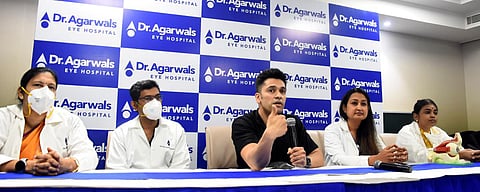

CHENNAI: The pandemic has fundamentally challenged not just the healthcare systems in the country but also led to an alarming increase in the incidence of chronic health disorders. A case in point is Thyroid Eye Disease (TED), an autoimmune eye disorder in some thyroid patients that progressively damages tissues and muscles around the eye area.
Doctors at Dr Agarwal’s Eye Hospital at a media briefing on Thursday said that TED has risen by at least 25 per cent in the country during Covid. This is due to thyroid patients avoiding regular check-ups fearing risk of exposure, a rise in stress levels and other pandemic-related psychological triggers, explained Dr Ashvin Agarwal, the executive director and head of clinical services.
However, not all thyroid patients have this condition; about 90 per cent of them suffer from hyperthyroid and some, hypothyroid, they clarified. “The condition also affects women more as they are more prone to autoimmune disorders,” shared Dr Priti Udhay, head of oculoplasty and aesthetic services.
Categorising the different symptoms with the acronym VISA (vision, inflammation, squint, and appearance), Dr Agarwal mentioned that TED patients have impaired/double vision, progressive inflammation of the tissues around the eyes, misalignment of the eyes and restriction in eye movement causing a squint, as well as disfiguration due to inability to shut them, bulging, swollen or bloodshot eyes and puffiness of eyelids.
The doctors emphasised that one must maintain thyroid levels with medication, keep diabetes under control, reduce smoking, and practice frequent vision checks at home. Dr S Soundari, Head of Medical Services, urged those at risk to get a regular examination with an oculoplastic doctor. Dr Udhay shared that patients can avail the services of oculoplastic surgeons to improve appearance and function of the eyes and its surrounding areas. This can be done through Botox treatments or keyhole cosmetic surgeries, depending on whether the disease is in an active or inactive stage.